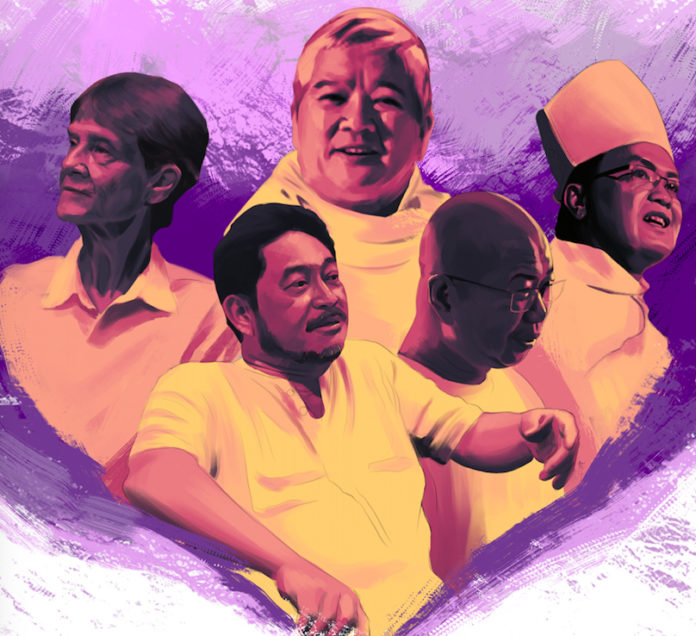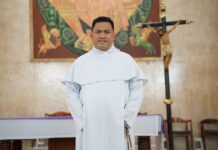They came for Fathers Marcelito Paez and Richmond Nilo. And today, more clergymen in the country have bared that they might face the same fate as those of the slain priests.
ONE OF the Catholic priests facing death threats called on the faithful to condemn extrajudicial killings under President Rodrigo Duterte’s war on drugs, saying their silence could be deemed as “collaboration.”
Fr. Albert Alejo, S.J. came out last month, with fellow priests Flaviano Villanueva and Robert Reyes, to reveal threats they had been receiving since criticizing the drug war, which has killed more than 5,000 people based on the government’s own estimate.
“After three years, silence now is collaboration to the extent that we are not critical enough,” Alejo told The Varsitarian.
“We are collaborative with the crimes and therefore, there’s also blood in our hands.”
Catholics, he said, should not turn a blind eye on the killings “when our Lord is a victim of extrajudicial killing” as well.
“It is very hypocritical of us that the crucified Christ is always in our altars, but we fail to see the connection when it comes to other people,” he said.
“Are we so blind not to see that?”
Widespread killings in connection with the Duterte campaign against illegal drugs have prompted preliminary examinations of the International Criminal Court (ICC)
A defiant Duterte earlier withdrew the Philippines from the Hague-based ICC, claiming its prosecutor had prejudged him.
The cases — called information at this stage in the examination — covered incidents when the Philippines was still part of the international body.
Sacred mandate
Villanueva, a Society of Divine Word priest, said Catholics’ continued support for the president’s bloody drug war “gives us a very sad image of how ignorant Catholics are with regard to the Gospel.”
“The best arena for Catholics to live their sacred mandate of following Christ,” he said, “is in a political arena where we are called to speak the truth and condemn the lies, where we are called to provide ways that are moral and just and continue to enhance and promote the sanctity of life to the fullest.”
Aside of the three priests, Bishop Pablo David of Caloocan had also been receiving death threats since he condemned widespread killings under Duterte’s drug war.
David’s diocese has seen many of these killings of drug suspects who allegedly fought back (“nanlaban”) during police operations.
Lingayen-Dagupan Archbishop Socrates Villegas was threatened as well.
In February, the former president of the Catholic Bishops’ Conference of the Philippines, got a text message, warning: “Ihanda niyo na ang lugar ng pagbu-burulan niyo…dahil ang sunod na Misa ay Misa para sa kapayapaan ng kaluluwa niyo.”
Just last year, Australian missionary Sr. Patricia Fox was deported after Duterte ordered an investigation on claims she was participating in political movements in the country.
Duterte threats
Alejo said killing clergymen would only produce more criminals in society.
“Pag pinatay nila ako, ibig sabihin may tao na ang naging papel niya ay ang pagpatay sa akin,” he said.
“Ayaw ko ng may pumapatay dahil sa pag dami ng pinapatay, dumadami rin ang pumapatay. Ayaw ko dumami ang mga krimen kaya ayoko maging martyr dahil ang katumbas niyan [ay] meron din naging criminal.”
Critics have blamed the death threats on Duterte’s constant attacks on Catholic priests in his speeches.
“Papatayin ko talaga kayo. Bishop ka [tapos] magpabili ka ng droga diyan? [Kung] hindi kita pinutulan ng ulo,” he once said.
Duterte also threatened to “kill bishops” because all they supposedly did was to criticize.
Nueva Ecija Bishop Roberto Mallari said Church leaders were apparently offending certain people for speak out against the killings.
“The reality of drugs, when we talk about that, we [may] offend people,” said Mallari, who heads the CBCP’s commission on catechesis and Catholic education.
“The government may be offended because of the way they do things and we in the Church do not agree with the killings happening.”














